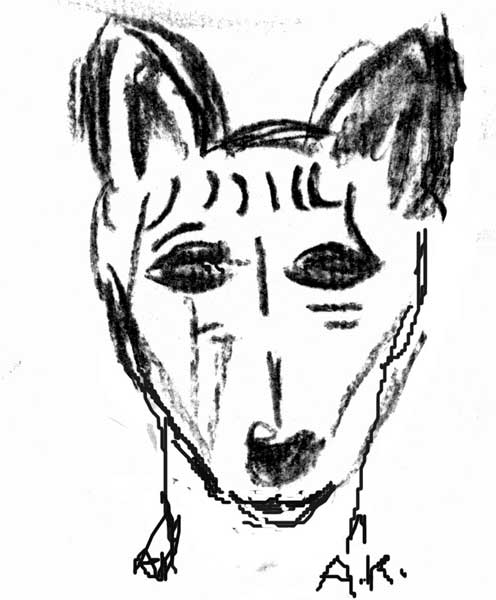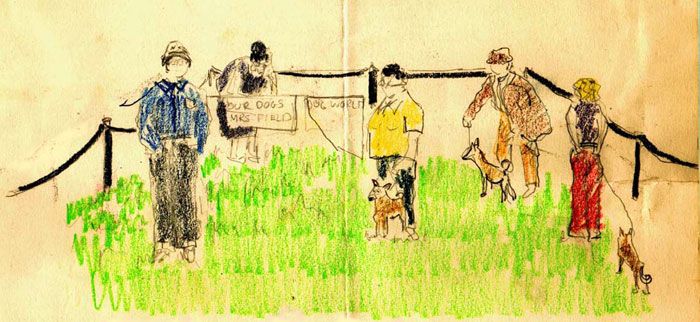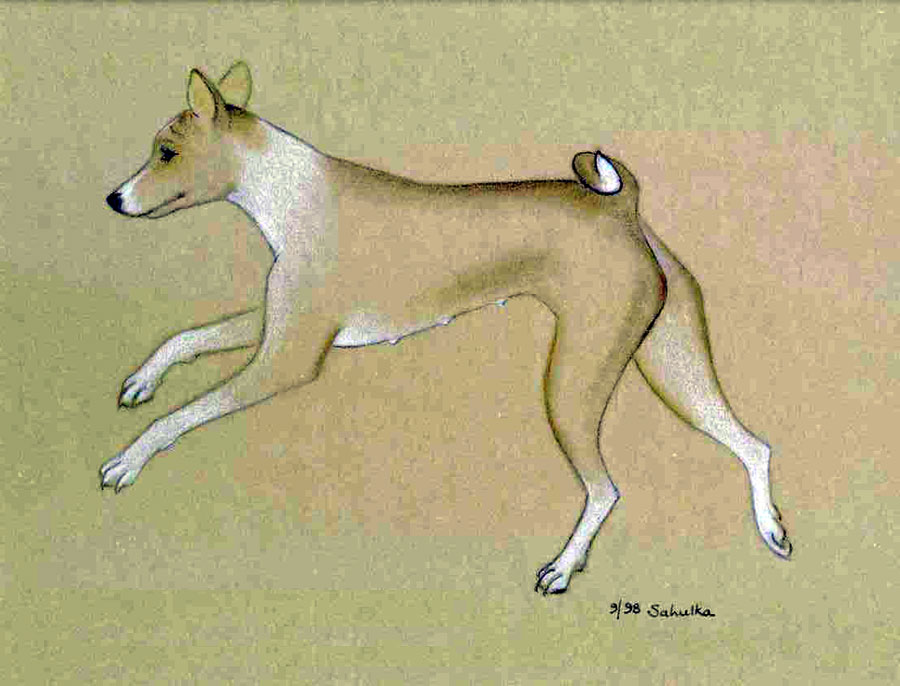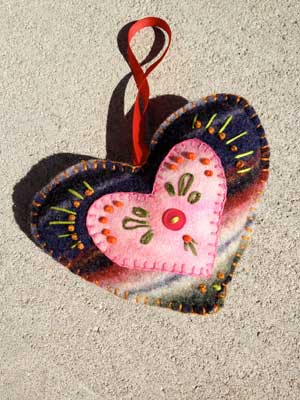XX, Issue 1, February 2016
Page 14 < previous page > <next page>
Do you remember Dakota?
http://community.seattletimes.nwsource.com/archive/?date=19971019&slug=2566856
Dakota's Saga Is Accented With Irony
 Drawing by Annelies Kamen, many years ago.
Drawing by Annelies Kamen, many years ago.
by Ranny Green, Times Pet Columnist
"Don't give up. Don't ever give up." - the late Jim Valvano, former North Carolina State basketball coach.
There's gonna be a homecoming party in Coral Springs, Fla., soon that will make last week's celebrations surrounding the Florida Marlins' entry into the World Series look like a minor-league bash.
Dakota, the dog who defied death, will be coming home. In fact, the odds the basenji's owners, Dorothy and Ken Bosted, would be reunited with the nearly 2-year-old animal were longer last month than the Marlins' chances of reaching the Fall Classic.
Life is often fraught with irony. Twice earlier when those involved should have been celebrating, they found themselves buried in despair.
On Aug. 17, Pat Cembura of El Sobrante, Calif., guided Champion Desert Ful-A-Charisma (Chris), Dakota's sire, to a his first hound-group championship at the Olympic Kennel Club show in Enumclaw. Ecstatic, she returned to the grooming area where five other basenjis she was campaigning were quartered. There were only four at home, however. Arubmec's Dakota Charmer (Dakota) escaped his exercise pen and was missing.
Thirty-eight days later, upon receiving word an emaciated and exhausted Dakota weighing about half his normal body weight had been found alive alongside a logging road four miles away, Ken Bosted was rushed to a hospital an hour later with symptoms of a heart attack. After a heart attack was ruled out, Bosted, 51, underwent his fifth and sixth angioplasties.
Almost every emotion imaginable surfaced during the month-plus odyssey that cost Dakota's owners more than $4,000, considerable heartbreak and anxiety but produced a recognition that "there are plenty of good people left in the world."
"Dakota went to California and Washington in search of his championship," says Dorothy Bosted. "Instead, he became a champion of basenjis and a symbol of perseverance, strength, faith and survival of all of us. He reminds us that life is very fragile and temporal, but more complete because we share it with loved ones."

The Bosteds are relatively new to the show scene, but Cembura is one of the nation's premier basenji breeders and has been criss-crossing the nation with dogs for more than two decades.
"One minute I was ecstatic getting Chris a Group 1 (first place in the group judging)," recalls Cembura, "the next I was frantic. In all my years of showing dogs, I've never lost one.
"Basenjis are the Houdinis of the dog world. If there's a way out, they'll find it. No one saw him get out, but it's my guess one of the holding clips - they are positioned about a foot apart in the 4-foot-by-4-foot wire enclosure - wasn't spaced correctly. Dakota found the weakness and simply climbed out."
After Dakota was discovered missing, Cembura still had to exhibit Chris in best-in-show. "My heart wasn't in it," she adds.
Fortunately for Cembura, Janine Prindle of Enumclaw, a 4-H club leader whose focus is on raising puppies for Guide Dogs for the Blind, was still on the grounds.
Prindle, a former basenji owner, and her group had been setting up and cleaning the site for four days and promised to help.
"I called seven or eight 4-H leaders," she says, "and the next morning I was astounded to find 35-40 people show up to look for Dakota."
By then, Cembura, who remained on the King County Fairgrounds in her 32-foot motor home, had 500 posters ready to distribute. They combed the area and learned Dakota had been sighted on the 10th hole of a golf course adjacent to the fairgrounds parking lot, the day he escaped.
"He was later seen on the 16th hole `having a ball,' " recalls Bosted. "Most of the staff and golfers had great tolerance and understanding. Pat was even loaned a golf cart to tour the area in the early morning hours before the course opened."
Within 24 hours, the 4-Hers distributed 1,500 posters to homes and businesses throughout the area. "Everywhere you turned, there was a photo of a basenji staring you in the face," smiles Prindle. "If you didn't know what one looked like, you'd have it imprinted in your mind rather quickly."
"It's interesting to describe your dog if it is not a popular breed," says Dorothy Bosted. "We ended up using phrases like "looks like a little deer," "will probably run if chased," "responds to cookie."
Hoping the dog would return, Cembura didn't call the Bosteds until the day following Dakota's disappearance. Danielle, 17, the Bosteds' daughter, took the call and immediately phoned her father.
"It was like someone kicked me in the chest," she says. "I sat on my bed sobbing, barely hearing a word she said."
Two days later, Ken Bosted and Danielle flew to Seattle to join the mobilized search teams. Included in their luggage was plenty of dirty laundry - shirts, pajamas and underwear with the family's scents, in hopes of attracting Dakota.
Dorothy made a recording of her calling Dakota, for them to take in case they tired of yelling.
"As we combed the area," adds Ken Bosted, "we played Dorothy's tape, plus we called, too. We also played a tape of basenjis yodeling. We staked out food and toys along with the dirty clothing, hoping if Dakota was nearby he'd recognize the scent.
"At night, we'd sit in the (rental) truck and wait and listen for dogs to bark. Then we'd head out on the road to follow up on the sounds. We even checked the dumpsters at the golf course and restaurants nearby every morning noon and night, knowing Dakota would be getting hungry and might try to get himself a meal."
But the two returned home several days later, empty-handed and dejected.
"They set down his crate in the front hallway and we had a family hug and cry. It was not easy to get on with life. Ken withdrew and tried to work. Danielle immersed herself in school and other projects," says Dorothy Bosted.
"The phone and the computer were like drugs in my hand. I couldn't accept that we just had to wait. There were too many things in my life that I've had to simply accept. I didn't want this to be one of them. I would keep fighting."
Other key resources for the Bosteds were Shelby Russell-Diaz, a King County Animal Control officer, and her mother Melody Russell, of Seattle, a lifetime member of the Basenji Club of America and one of three basenji rescue personnel in the state; and Shirley Raisch of Enumclaw, who attended the show, spotted a flier at a nearby feed store the next day and assisted in placing signs and searching; Dana McDonald of Woodinville, who made the three-hour round trip several times the first week and almost every weekend thereafter until Dakota was found.
Because the forests near Enumclaw are inhabited by bear, cougar and coyote, Russell-Diaz placed a humane trap for Dakota but it was untouched. She and Prindle spent countless hours coordinating searches for Dakota.
For four days, Cembura maintained her motor home command post in the fairgrounds parking lot. She slept with the door open at night, hoping Dakota might return.
Help came in many ways. In addition to search parties, others brought food, assisted with her dog laundry (towels, bedding, etc.; remember she had five other basenjis with her) and simply sat and listened, offering encouragement in the process.
After Cembura returned to California and the Bosteds to Florida, Dorothy Bosted contacted John Keane, a k a Sherlock Bones, a Californian who specializes in finding lost pets.
"He told me that of the pets recovered, 90 percent are found within two miles of where they disappeared," she says. He designed postcards, like those for missing children, with details about Dakota and listed a $250 reward.
They went to 300 households within that radius, plus 700 more within a four-mile radius. The postcards also were delivered to 70 veterinary hospitals and shelters within 35 miles.
Professional dog-show photographers Mary Dee and Carl Lindemaier, of Lake Oswego, Ore., knew what losing a dog meant. Theirs disappeared at Seattle-Tacoma International Airport as a result of careless baggage handling, but was found soon after. The photographers placed one-quarter page inserts with information about Dakota in 1,000 photo mailings during a two-week period.
"We didn't know if Dakota had been stolen, although we felt it was remote possibility," adds Bosted. "But, just in case he turned up a dog show somewhere, it was worth a shot."
For a month, all the principals anguished over Dakota's fate. On Day 30, Bosted received a call from Raisch, informing her of a dead-dog report in the area. Neither Raisch nor Diaz-Russell could find the carcass, and the matter was discounted.
"After that, I started to clean up my desk and try to move on a little more," says Bosted. "Ken said I never really accepted it was over, no matter what I said."
By then, even the once-confident Prindle had resigned herself to Dakota "becoming dinner for a coyote, cougar or even a bear. If he was alive, I knew he'd be in a weakened state and unable to defend himself very well."
But Day 38 (Sept. 24) brought good news. Judi Tolboe and Heather Dickson, of Enumclaw, were riding horses on a warm afternoon along a Weyerhaeuser Co. logging road, three to four miles east of Enumclaw, when they spotted a dog they felt certain was Dakota, about 50 feet away.
"I knew it was him from the poster at the trailhead," says Tolboe. "We called but he ran off. So we rode back to the parking lot, which was only a quarter mile away, and got the horses into the trailers. I used my cell phone to call the numbers on the poster and left a message for Janine, telling her of the sighting.
"It was fate that we spotted him. We left late. This wasn't even the trail we'd planned to ride. In fact, the next time we rode the trails we'd planned to take down some of the posters to help keep the area clean. They'd been up for a long time and quite frankly I didn't think the dog's chances were too good at that point."
Prindle responded within a couple of hours and the trio agreed to meet later and return to where Dakota had been sighted.
"We were talking as we neared the site," recalls Tolboe, "and there he was curled up beneath a tree."
"I thought he might bolt," adds Prindle, "so I inched over toward him with a leash in hand. He offered no resistance, however. I think he was happy the ordeal was over. I couldn't believe my eyes. He would have been a perfect subject for a college veterinary class anatomy lesson. You could see every bone in his body."
With Dakota wrapped in a sweatshirt, the giddy trio headed back to Prindle's home to call his anxious owners in Florida.
Recalls Bosted, "I remember her saying, `Guess what? We have a little red and white boy basenji in our arms.' I screamed, dropped the phone and started to cry. Ken picked up the phone and took over. Danielle came running in from the garage. We just hugged each other and cried. We laughed in happiness for the first time in more than a month and used the phone # 69 function to confirm it was Janine."
Shortly thereafter, Ken began experiencing pains, leading the family to think he might be having a heart attack. He was taken to a nearby hospital several hours later.
Amidst the excitement, Bosted called Cembura in California to pass along the good news. "You can't believe how relieved I was," recalls Cembura. "It was like the weight of the world was lifted off my shoulders."
Prindle's next step was to get Dakota to her veterinarian, Dr. David Gran, in Buckley. The dog weighed 12 1/2 pounds, almost half of its normal weight, was emaciated, dehydrated, anemic and flea infested.
A strict diet, water, vitamins and flea bath were prescribed. While his muscles were atrophied significantly, Dakota was projected to recover fully.
In the interim, Bosted sent many of Dakota's belongings, including his bed and toys, to Prindle, which helped establish an immediate comfort zone once he picked up the scents of home.
His recovery regimen has enabled him to gain several pounds. While he has four points toward his American Kennel Club championship, the family plans to retire him indefinitely. "We want to enjoy the miracle of having him home," says Bosted.

"He's a little Napoleon," says Prindle. "He definitely has the respect of Jordan (her 9-year-old flat-coated retriever) and Poppy (her Scottish fold cat). In fact, one night, Poppy found herself in Dakota's mouth." Now Dakota sports a cat collar with a bell to signify he's on the move.
The $250 reward, by the way, will be given by the three rescuers to the Enumclaw area 4-H clubs.
And the GREAT Classic - Dogs in Elk?
CLICK HERE
 Heart by Andrea Stone
Heart by Andrea Stone